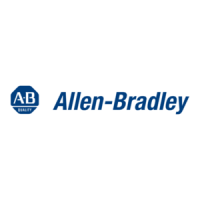
Do you have a question about the Allen-Bradley 2711P-T6C20D8 and is the answer not in the manual?
| Series | PanelView Plus 6 |
|---|---|
| Model | 2711P-T6C20D8 |
| Resolution | 640 x 480 pixels |
| Touchscreen Type | Analog Resistive |
| Touch Screen | Yes |
| Operating System | Windows CE |
| Power Supply | 24V DC |
| Display Type | Color TFT LCD |
| Communication Ports | Ethernet, RS-232 |
| Operating Temperature | 0°C to 50°C |
| Storage Temperature | -20 to 70 °C |
| Relative Humidity | 5 to 95% non-condensing |
| Certifications | CE, UL, cUL |
Explains the Windows CE operating system features and functionality on PanelView Plus 6 terminals.
Details environmental and enclosure requirements for terminal installation to ensure safety and proper operation.
Provides information on hazardous location approvals for PanelView Plus 6 terminals in North America.
Provides step-by-step instructions for mounting the 400 and 600 series PanelView Plus terminals into a panel.
Details the procedure for mounting the 700 to 1500 series PanelView Plus terminals into a panel.
Explains how to remove and install the power terminal block for PanelView Plus 6 terminals.
Details the DC power ratings and connection requirements for PanelView Plus 6 terminals.
Explains the mandatory earth/ground connection requirements for PanelView Plus 6 terminals.
Provides step-by-step instructions for connecting DC power to PanelView Plus 6 terminals.
Details the AC power ratings and connection requirements for PanelView Plus 6 terminals.
Provides step-by-step instructions for connecting AC power to PanelView Plus 6 terminals.
Explains the different methods available for restarting or resetting the PanelView Plus 6 terminal.
Explains how to access the terminal's configuration mode from running applications or during startup.
Details the operations available within the FactoryTalk View ME Station Configuration mode dialog box.
Allows modification of non-application specific settings like alarms, display, and network configuration.
Provides steps to load and run FactoryTalk View ME .mer applications on the terminal.
Allows specifying what action the terminal takes on startup or reset (desktop, config mode, or application).
Covers allowing or restricting access to the Windows desktop on terminals.
Provides steps to enable desktop access on the PanelView Plus 6 terminals, including password setup.
Details how to disable or restrict access to the Windows desktop, requiring a password.
Guides users on setting a password and challenge question for desktop access security.
Explains how to reset the desktop access password and challenge question if forgotten.
Covers configuring communication settings for applications and controllers using RSLinx Enterprise software.
Explains how to connect to an EtherNet/IP network using the terminal's Ethernet port and RJ45 connector.
Covers operations for managing files stored on the terminal, including deleting and copying.
Allows adjustment of display intensity, temperature viewing, screen saver, and cursor settings.
Allows adjustment of settings for keypad, keyboard, mouse, and touch screen input devices.
Provides steps to calibrate the touch screen if it is not responding accurately to taps.
Allows configuring diagnostics for a target computer, including remote log setup and message routing.
Describes how to view and clear system event logs, which record warnings, errors, and events.
Covers changing the date, time, and time zone for terminal operations.
Lists the standard shell and user interface features provided by the Windows CE 6.0 operating system.
Details the additional operating system components provided with terminals that have extended features.
Provides an overview of the Windows Control Panel interface for configuring terminal properties.
Details how to back up and restore the terminal's system image, including advanced network and display settings.
Introduces the Hardware Monitor for viewing status and troubleshooting information like processes and system logs.
Allows control over desktop background, appearance, backlight brightness, and screen saver settings.
Details setting up NTLM user accounts for authenticating client connections to FTP, web, and file servers.
Covers configuring settings for VNC, web, FTP, file servers, and KEPServer activities on an Ethernet network.
Details configuring VNC server settings for viewing or controlling the terminal remotely.
Details configuring settings for HTTP web activities, including admin users and authentication.
Details crucial guidelines to prevent damage from electrostatic discharge when handling the equipment.
Warns about the risk of severe electrical shock or terminal damage if power is not disconnected.
Provides instructions for installing or replacing the logic module of 700, 1000, 1250, and 1500 terminals.
Details the process for installing or replacing communication modules on PanelView Plus 6 terminals.
Explains how to replace the display module for 700, 1000, 1250, and 1500 terminals.
Explains how to replace the lithium battery used for the real-time clock in PanelView Plus 6 terminals.
Provides critical safety and wiring guidelines for connecting devices, including routing cables and grounding.
Explains how to connect to an EtherNet/IP network using the terminal's Ethernet port and RJ45 connector.
Details the two-step process for upgrading firmware using a USB flash drive or SD card.
Explains how to transfer firmware files from a created upgrade card to the terminal.
Details upgrading firmware via a network connection using RSLinx Enterprise software.
Offers troubleshooting tips for terminals that do not start properly, focusing on power and indicator checks.
Offers tips for isolating anomalies related to Ethernet connections, including status indicators and IP addresses.
Suggests using Ping, ipconfig, and other tools for network debugging and diagnosing system errors.
Explains how to access maintenance mode for diagnostics and repair purposes.
Details how to restore the terminal to its original factory default state, often after a failed firmware upgrade.


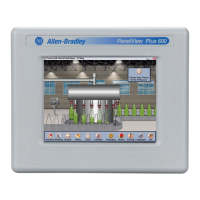
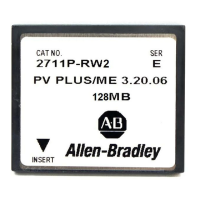
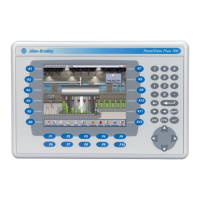
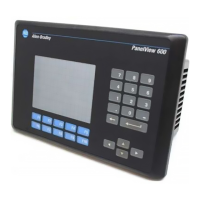
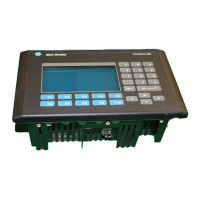
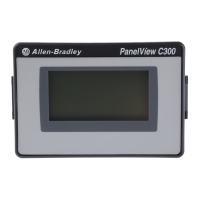


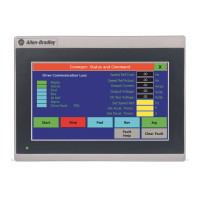

